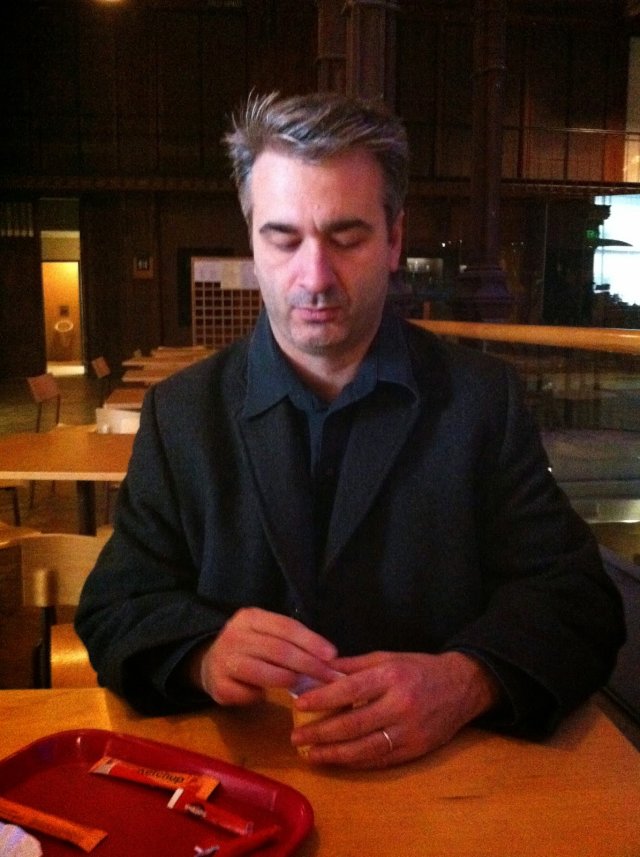
Sean Rabin
The introspective writer of the story “No” in volume XXXV of The Worcester Review, Sean Rabin reminds his readers of the value of perseverance and never becoming slave to custom.
When did you first begin to play with language? Did writing find you or you it? That is to say, what inspired you to write?
I remember writing my first poem at ten, and realizing how much fun it was. Here was something I could actually do without needing money or formal lessons or anyone’s permission. I didn’t grow up in a particularly bookish family, so I suppose writing found me. I wrote my first novel at fifteen just to see if I could finish it. Ideas have always come easily to me, but learning to write well took a long, long time. As life grew more complex, I found writing became increasingly necessary for me to navigate the world. Although I’m not particularly interested in realism, the act of writing somehow helps me to process what’s going on in my life. When I write I feel as though I’m functioning at my best. Doing exactly what I am supposed to be doing. When I’m not writing I pretty much feel like I’m wasting time. It’s not a particularly social way of living, but the people who know me know I don’t have a lot of choice in the matter.
What was the inspiration behind “No”?
Rejection. Being a writer involves a hell of a lot of rejection. Strangers saying NO to your writing, your ideas, and therefore you. Irrespective of how well you rationalize it as part of the publication process, it doesn’t make those form letters any easier to take. So I wanted to discuss the power of the word NO growing larger and more ominous in the mind of an individual. And how NO had the potential to keep that individual locked in a room simply through the acceptance of its conventional meaning. And, of course, I wanted to discuss the idea of breaking free through ignoring its conventional meaning. The story is also a battle cry to never give up.
In “No,” the main character struggles against physical and mental conditions imposed upon him, and it is in a state of both revelation and desperation that he finally “[s]ees the NO for what it really is.” What does this mean to you personally? In your opinion, what does it mean to redefine language in today’s world?
Like every writer, I sometimes glimpse the meaninglessness of words. Because we are constantly putting them together letter by letter, it can occasionally become apparent that the only power they possess is what we attribute to them. When a child asks you why the word “fuck” is impolite, it’s a pretty difficult question to answer. In truth we know it’s nothing more than a social convention. And for me the role of art is to question conventions. One of the things I enjoy about writing is assigning unexpected meanings to words. Repeatedly using a word in an unfamiliar context until its conventional meaning is lost and a new meaning arrives for the reader. Reification: taking an abstract concept and making it a reality. A quick glance through an etymological dictionary reveals how the meanings of words are constantly being redefined. We know this is an essential process for a language to survive. So for me, redefining language means doing my part to breathe life into it.
Have you noticed any recurrences between your works? Are there patterns or themes that reemerge in your writing, or is each piece vastly different?
Not repeating myself is something I aspire to as a writer, so hopefully each story I write is different. I’ve always believed that the structure of a story should reflect the narrative, so as long as my stories don’t all look the same I feel confident each one is saying something different. I’m not sure if there are common themes throughout my work. A friend once pointed out that physical distress seems to occur to a lot to my characters, and I’d have to agree with that. People have also described my work as uncanny, although it might not seem that way to everyone. I like writing that tells a story rather than simply conveying a mood, and hopefully I always satisfy my readers in that department.
In addition to “No” appearing in volume XXXV of The Worcester Review, your writing has also appeared in several other publications. What are the top three things to which you attribute your success?
The three things I attribute to my success? Perseverance. Reading widely. Paying attention to my imagination.
The Worcester Review would like to thank Sean Rabin for contributing to volume XXXV and for participating in the online blog series.
